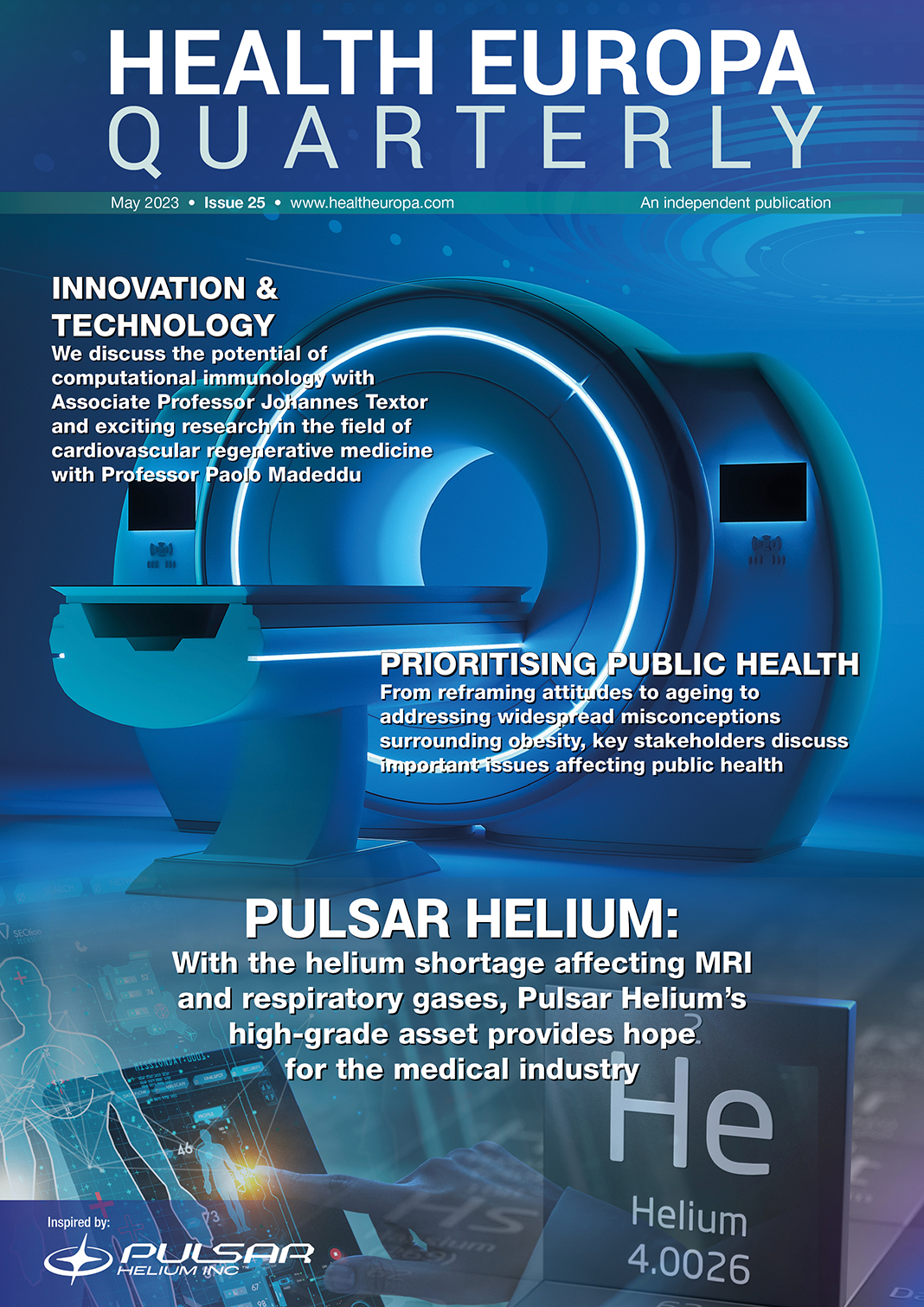Welcome to Health Europa Quarterly Issue 25, where you will discover the latest health research addressing global health policy, antimicrobial resistance, medical technology, disease management, medical cannabis, and drug development.
In my time as editor of this publication, I have been fortunate enough to interview leaders across sectors who are helping to shape healthcare for the better. Despite the unprecedented challenges that health systems, and society as a whole, continue to face, those leaders have shown resilience and an unwavering dedication to improving the provision and access to health and care on a global scale. Achieving truly global health requires a multidisciplinary approach, where stakeholders across industries work collaboratively and transparently together to implement sustainable, equitable and tangible measures that ensure health systems can develop and adapt alongside our ever-changing world and healthcare needs. Global pandemics and humanitarian crises have, undoubtedly, made it harder to maintain momentum in this endeavour, but they have also exposed shortcomings that health systems and policymakers must learn from.
With that being said, this issue of Health Europa Quarterly opens with a special feature on global health where UN system funds and entities tell us how they work tirelessly to create a positive impact and protect those in need. In 2014, the Joint United Nations Programme on HIV/AIDS (UNAIDS) released a ‘Fast-Track: ending the AIDS epidemic by 2030’ report which comprised a set of targets centred on averting almost 28 million new HIV infections by 2030. Two years later, a new Political Declaration with time-bound targets was committed to by UN Member States to support a fast-track approach. I spoke to Eamonn Murphy from UNAIDS about whether the 2030 target is achievable, and how inequality is a barrier to progress. Following this, Aaron Greenberg, Regional Chief of Child Protection at UNICEF, shares how humanitarian crises can impact children’s long-term mental health. I also discuss gender equality in the context of the Sustainable Development Goals with Ginette Azcona from UN Women.
Our subsequent Health Policy section includes a thought-provoking interview with Benjamin-Alexandre Jeanroy concerning the regulatory challenges France faces as it navigates the establishment of a medical cannabis industry. Rare Diseases Europe also shares its view on the latest revision of the EU’s pharmaceutical legislation.
Antimicrobial resistance continues to dominate our Infection Control section; it opens with an interview with Professor Diane Ashiru-Oredope, Lead Pharmacist at the UK Health Security Agency, who discusses antimicrobial prescribing and stewardship in the UK and where future efforts need to be focused. Kelly Thornber, a Post-Doctoral Research Fellow at the University of Exeter, explains the complex factors driving pharmaceutical pollution and why this issue should be integrated into sustainable healthcare strategies. We also discuss antibiotic use and drug resistance with Jonathan Pearce, CEO of Antibiotic Research UK, and, subsequently, Jane Tredgett, Campaigns Manager for the Alliance to Save Our Antibiotics. We round off this section with a timely interview with Dr Jim Connolly, President of the European Society for Emergency Medicine, about the specific challenges faced by EM personnel and the effects of the current workforce shortages.
Longevity does not simply equate to a long life, but a life free from the burden of chronic diseases. Many older adults spend their twilight years tackling comorbidities, heart disease being key among them. Earlier this year, a groundbreaking study detailed how a mutant anti-ageing gene could reverse the age of the heart and hopefully broaden curative options for cardiovascular diseases. I spoke to cardiovascular regenerative medicine expert, Professor Paolo Madeddu, to find out more. Within our Innovation and Technology section, we also look at how researchers are harnessing the power of AI to broaden our understanding of the – somewhat enigmatic – immune system and create revolutionary diagnostic tools.
Important topics concerning public health are discussed in our final section. Jacqueline Bowman-Busato, Head of Policy at the European Association for the Study of Obesity, explains how misconceptions surrounding the drivers of obesity impact patient access to care. Given that one in five children and one in ten adults in the UK alone are affected by eczema, we asked National Eczema Society about how chronic skin conditions affect mental health. Population ageing is often cast in a negative light, but why? We put the question to Professor Joan Costa-i-Font from The London School of Economics.
It has been a privilege bringing this issue together and I hope you find the following pages as interesting and informative as I have in their collation.
Lorna Rothery
Editor
Health Europa Quarterly









